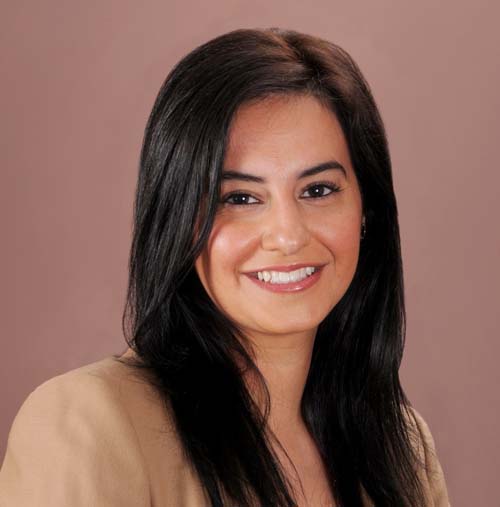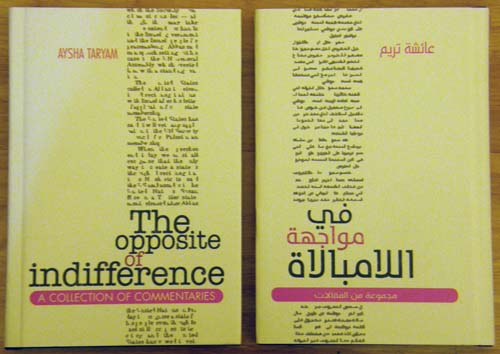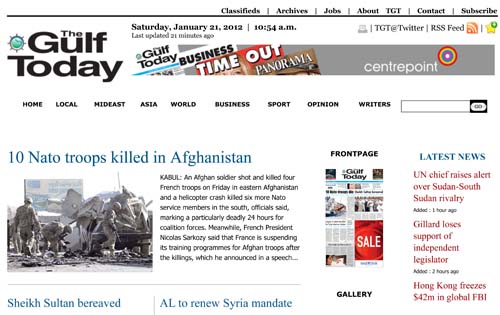Attractive, spunky, and often "in your face," but with a message that one shouldn't be indifferent to what's wrong with the world, and she uses her editorial platform to push hard for change.
It's a daring approach by Aysha Taryam, the 32-year-old editor of the English-language daily The Gulf Today, who doesn't mince words and ruffles quite a few feathers.
 Aysha Taryam (courtesy of Taryam)
Aysha Taryam (courtesy of Taryam)
In the introduction to The Opposite of Indifference, her maiden book of commentaries, Taryam recalls growing up in a world filled with words.
Her family owns the Sharjah, United Arab Emirates, publishing house Dar Al Khaleej (and flagship daily Al Khaleej), and her indifference stemmed from being blasé to her environment as a child.
"With time came the realization that words can be both one's escape from reality and one's weapon, should he choose to confront it. The power of the word compelled me to write a few of my own and as indifference became a luxury I could no longer afford, I chose confrontation," she said.
The book published in English and Arabic is a collection of musings divided into chapters on media, the Emirates, politics, feminism, writers, and, concludes with a section entitled "Truth Be Told."
Taryam's comments on media are especially telling and sharp.
She accuses newspaper readers of pouring fuel on media baron and scandalmonger Rupert Murdoch's fire, and then crying help, notably in the unfolding events of phone tapping and computer hacking of celebrities, politicians and common folk.
The reason why tabloids still make profits while respectable journalism struggles to make ends meet is you, the reader. When you would rather read about a politician's torrid love affair rather than his active role in governmental policy, you become a particle in the force pushing papers like News of the Worldover the lines of ethics and human rights. People have an innate curiosity for the affairs of others and this curiosity is never satisfied. Readers don't want to know how a tabloid gets its information they just want it.
Another article points to the power of social media, but Taryam argues that their sites did not create the still unfolding revolutions in the Arab world. Rather, they advertised them, much as pamphlets and underground newsletters did in the past.
A piece entitled "Orwell Saw the Black in Blackberry" refers to British author George Orwell's prophetic novel 1984 in which he cautioned about governments seeking to control their people by monitoring all their actions in the name of national security.
Enter technology, and the intrusiveness and potential (or real) harm of the World Wide Web, which Taryam sees as the game changer that proved Orwell's point.
"The social networking site Twitter has donated the entire world's status updates (tweets) to the United States Library of Congress claiming they took this step for the 'preservation and research' of tweets. Why would the Library of Congress want to preserve and research random peoples' updates? Regardless of the reasons, whatever you decide to use your 140 characters for, rest assured they will be archived and never be erased. Once you send that tweet you can never take it back."
 The Opposite of Indifference English and Arabic editions (Abu-Fadil)
The Opposite of Indifference English and Arabic editions (Abu-Fadil)
On the Emirates, Taryam criticizes university graduation ceremonies in her country that host government officials who bore the audience to death instead of lighting a spark in the new graduates to set them on their merry way, as institutions in the West do.
"Don't teach, inspire," she titled a commentary in which she urged UAE universities to provide graduates with native role models who have excelled.
Her criticism gets harsher when she writes about the trend in her country and the Gulf region of importing branches of well-known foreign universities to add glitter to the field of education and turning these institutions into profit-making endeavors.
"The current education system in the UAE seems to be taking its cue from the Starbucks model for success, mass franchising and churning out degrees/lattes by the dozen. It is quantity not quality that matters the most."
Her argument: an education system based on brand names is flawed and a university branch is almost always a second-rate version of the original, so why settle for it?
Taryam also takes a swipe at politics and politicians, with a commentary entitled "Obama Kills Osama to Remain Alive."
"The truth is, it cost the United States billions of dollars and thousands of human lives to eliminate a man who was apparently hiding in plain sight," she wrote, adding that Osama Bin Laden's death came as no surprise to the Arab world, but that its timing was unforeseen.
Had he been killed months earlier, Arab reactions would have been resentful, but, she said, as news of Bin Laden's death broke at a time when the plates of the Middle Eastern political world were shifting, Arabs seemed more subdued and indifferent.
"The American presidential elections have to also be factored into this equation, which resulted in the quick sudden death of the world's most feared man," she opined.
Feminism is another topic Taryam tackles with deft and advises readers not to fear using the "F" word.
"The word feminism has become synonymous with the idea of man-hating when in fact it has more to do with women than men," she wrote, using the example of Christine Lagarde, the former French finance minister who became the first female head of the International Monetary Fund.
"She was described in an article as a 'divorcee with two sons,' a description I have yet to read about a man in any position," Taryam said. Right on!
 The Gulf Today screen shot
The Gulf Today screen shot
Aysha Taryam, who graduated from the American University of Sharjah, is the first Middle Eastern female editor-in-chief of an English language daily broadsheet.
She embodies the twin qualities of a writer and a defiant liberal campaigner.
